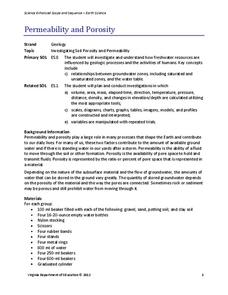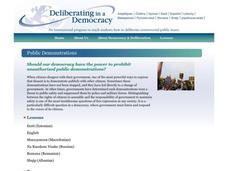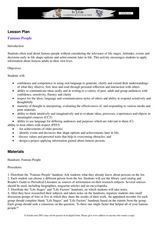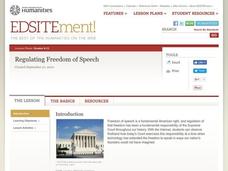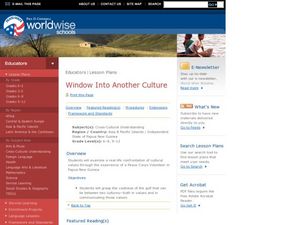WindWise Education
How Do You Feel About Wind Energy?
Tell me what you really think. The class reviews articles related to wind energy to see how the author uses words, phrases, and images to sway the reader. Through a class discussion, individuals share their feelings from the media...
Wind Wise Education
What is the Cost of Inefficiency?
What does it cost to keep the lights on? Through a hands-on activity, class members use a watt meter and determine the amount of energy different types of light bulbs use. The class then determines the financial and environmental...
Virginia Department of Education
Permeability and Porosity
Covering both permeability and porosity, scholars perform a hands-on experiment testing various soil types. The material includes a pre-lesson worksheet to help focus pupils on the task at hand.
Heritage Foundation
The Constitution, Federalism, and the States
The divide between federal and state government is responsible for much of tension that continues to this day, partly because of the US Constitution. The activities in the 14th lesson in a series of 20 are designed to help learners...
WindWise Education
What Factors Influence Offshore Wind?
What is that out in the water on the horizon? Teams work together to study the coastline using maps to determine the best and worst locations to place an offshore wind farm. The teams then build a scale model wind farm to see what it...
PBS
Evolution of the Presidency: Theodore Roosevelt to Franklin D. Roosevelt
How much power should a president be allowed to exert? Theodore Roosevelt and Franklin D. Roosevelt exercised their power according to their interpretations of the United States Constitution, and these interpretations affected the...
Deliberating in a Democracy
Public Demonstrations
Have you ever fought publicly for an idea you believe in? Scholars research and analyze the right to demonstrate peacefully. Incorporating different real-life scenarios as well as legal decisions exposes the concept of democracy and free...
Curated OER
Gender-based Temperance Reform
Eleventh graders investigate the Temperance Reform Movement. In this primary source analysis lesson, 11th graders use the provided analysis sheet to analyze the contents of the article "Advice to Young Women and Young Men," published in...
Wind Wise Education
Can Wind Power Your Classroom?
Can you power this? Individuals do an energy audit for the classroom to determine the amount of electricity needed to power it. Using either live data or sample data from wind turbines they decide whether it would power the classroom....
Wind Wise Education
Understanding Electric Power Generation
You mean the electricity does not come from the switch? As a class and in small groups, learners explore the sources of energy used to generate electric power. Worksheets guide groups into choosing a future electricity generating...
Curated OER
Focused Learning Lesson: American History
Eleventh graders examine the 1920s which was known as the "Roaring Twenties". They identify the Harlem Renaissance, Prohibition, and the Women's Suffrage movement.
Curated OER
USING TORTURE ON SUSPECTED TERRORISTS
Students examine how most countries prohibit torture. They explore why torture is still considered a possible tool for preventing future losses of innocent life. They discuss some of the facts, the mis-perceptions, the arguments, and the...
Deliberating in a Democracy
Free and Independent Press
Young scholars determine how free press principles can be compromised. For this global studies instructional activity, students read an article titled "Free and Independent Press." Young scholars respond to discussion questions regarding...
Curated OER
From The Great War To The Great Depression
Discover details about 1920's America. In this American history lesson, students read From the Great War to the Great Depression. Students then research famous Americans from the time period and present their findings to their classmates.
WindWise Education
Can We Reduce Risk to Bats?
It is just batty! A resource outlines a case study scenario of reducing the risk to bats. Teams learn about the bat populations in the area of the wind farm, then research and propose a solution.
Curated OER
What Makes a Good Law?
Why were laws created? Spark a group discussion on why we need laws to co-exist. Should the sale of some things be outlawed on Sundays? Read a case summary between Target and the state of Minnesota that debated this issue. Ask your...
Curated OER
In God We Trust; All Others Pay Cash
Learners review their knowledge on the First Amendment. After reading an article, they identify specific church and state issues. Using the Internet, they research President Bush's proposal from a specific point of view. They summarize...
Curated OER
Quality Control at Kality Krunchers Dill Pickle Factory
In a hypothetical scenario, food chemists use titration to concoct a brine solution for producing the crunchiest pickles. They also analyze store-bought pickle juices. In addition to reinforcing titration techniques, the lesson requires...
Teaching Tolerance
Using Photographs to Teach Social Justice | Legal Action: The Supreme Court
A social justice instructional activity focuses on the Supreme Court case Loving v. Virginia which struck down laws that prohibited marriages between African Americans and white Americans. The instructional activity begins with class...
Curated OER
The History of Ethanol in America
Sixth graders explore and examine the production of biofuels from the 1850's to the present. Included in their research is Henry Ford, ethanol, World War I and prohibition. They explain the importance of grains and grasses for the...
Curated OER
Ecosystem Services - Water Purification
Students see that ecosystems provide services to people that are essential to life as we know it. Reporters (drops of water) could interview the trees and soil in the surrounding ecosystems for news stories on how they helped keep the...
Curated OER
Regulating Freedom of Speech
Students examine the nature and limits of the Constitutional right to freedom of speech. They read and analyze the First Amendment, discuss various case studies, and research and record their own opinion on discussion questions.
Curated OER
Window Into Another Culture
Young scholars examine cultural conflict issues. In this global studies lesson, students read the Robert W. Soderstrom essay " A Single Lucid Moment." Young scholars discuss the essay and confrontation that may occur between cultures.
Heritage Foundation
Slavery and the Constitution
It's hard to believe the abolition movement was once seen as scandalous. Help learners understand how the US Constitution changed everything. A variety of activities such as corresponding reading activities, group work ideas, and...




